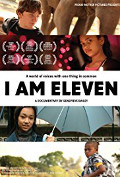
Directed by
Genevieve Bailey
90 minutes
Rated PG
Reviewed by
Sharon Hurst

I Am Eleven
Synopsis: Young filmmaker Genevieve Bailey headed overseas in 2005 armed with a video camera. She travelled 15 countries and interviewed many children aged 11.
I can’t help but think of two other films that share a similar spirit to that of Genevieve Bailey’s: the magnificent Seven Up series (which is about to become 56 Up) which test the premise, “show me the child at seven and I will give you the man” and follows its subjects’ lives in seven year cycles, and last year’s Life In A Day, which assembled video vignettes of people’s lives from all over the world in a portrait of the commonality of human existence.
Bailey’s film in some ways straddles both these approaches. Through her interviews we discover that youngsters at this age are very much embryonic adults and what we see now seems to heavily foreshadow how they will be when they enter their adult lives (though, of course, who really knows?) At the same time, Bailey showcases the many differences in lifestyles - from orphanage living, to single parent families, from affluent kids,to impoverished village life - yet with all there seems to be a common sharing of aspirations, fears and joys.
The kids and their locations are dramatically diverse. Jamira is a girl of indigenous/Irish heritage who lives with her dad in the housing commission in Melbourne; Goh works at an elephant farm in Thailand as does Aussie boy Jack. Remi is French, several children are English, with others from Sweden, USA, Bulgaria, Morocco, Japan, Germany, Sweden China, the Nederlands, along with a number from an orphanage in India.
Some of the kids are more memorable than others, but each has their own idiosyncracies and firm views on how they see life and the world. Contrasts are greatest when kids from the poorer countries express their hopes – “I wish we lived in a house” – compared with the wealthier ones wishing for a longer weekend and fewer school hours. Many express altruistic aspirations of wanting to help the world when they grow up (as teachers, nurses or doctors) and others have a seemingly universal hope of marrying and having their own family.
The kids express their opinions on such matters as bullying, war, romance and families. Some are precociously and impressively eloquent such as Remi, who is a social justice warrior in the making. He hates the fact that France treats its refugees badly and asserts “I am a citizen of the world”, expounding on how we are all part of the same species. Others, such as the delightfully eccentric Billy seem to live in a still child-like world of their own. Overall an untainted idealism comes through with most of them – an optimism for their futures and hopes for only good in their lives.
Even though this style of talking heads with shots of daily lives is not a ground-breaking approach, there is something really warm and uplifting about this film. As an audience, we can’t help but reflect upon our own lives, and what it means to be on the cusp of adulthood, no longer kids, not yet adults, and reaching out for what makes you truly yourself.
Bailey uses a lot of lovely close-ups so that we feel we really get to know these kids. What we see of their daily lives is interesting, although some are focussed upon more than others, and to have had fewer subjects and more detail may have been beneficial. Nevertheless, I Am Eleven should be an audience-pleaser for parents and pre-teens alike.

Want more about this film?


Want something different?




